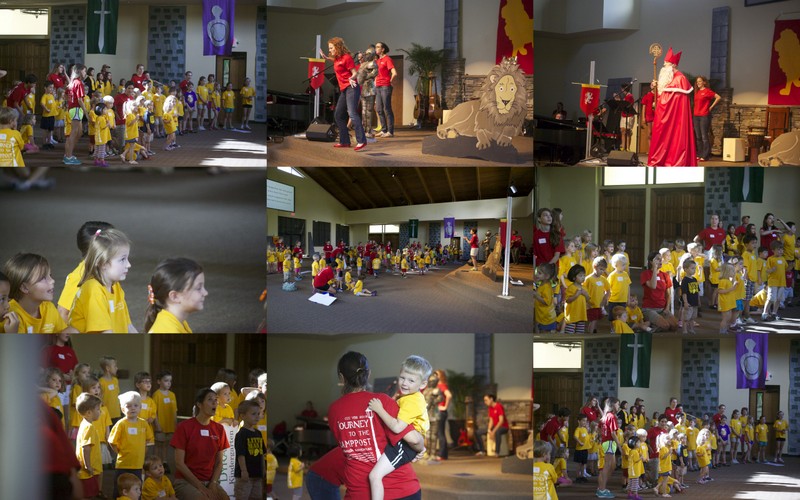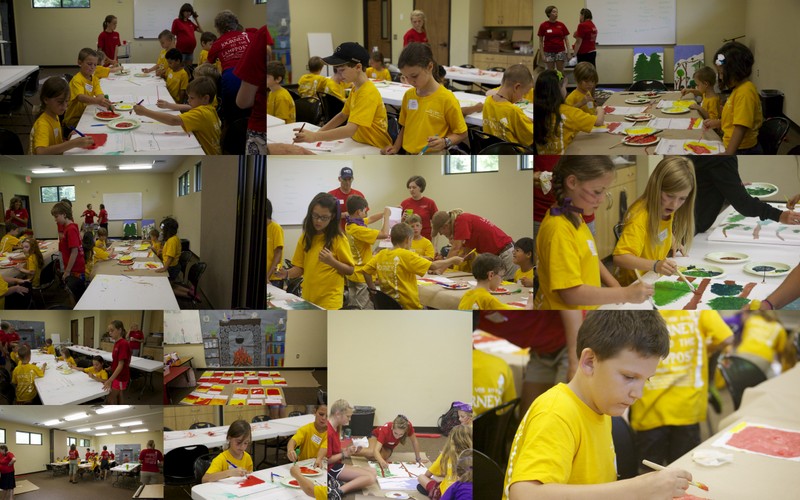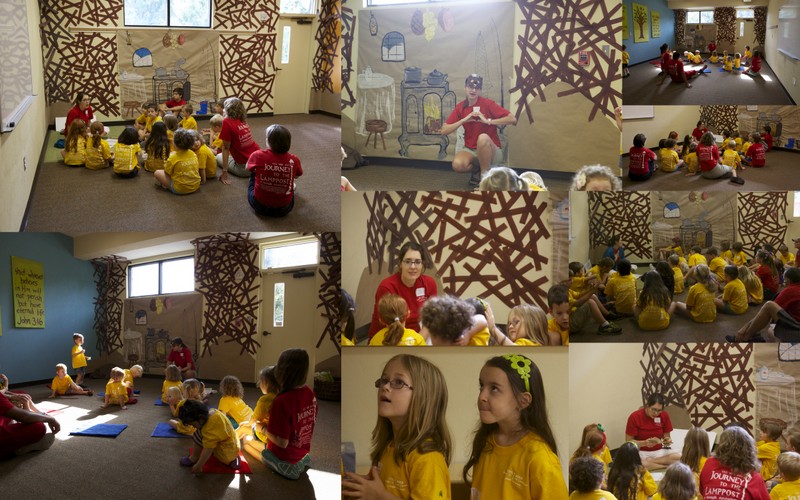GOD’S TIME SCALE is so different from ours. Abram wants a son, and feels his time is running out; God envisages a race with countless millions of descendants. Abram feels his life is approaching its termination with nothing very much settled as to God’s purpose in calling him out of Ur of the Chaldeans; God sees the entire course of redemptive history.
What God does in Genesis 15 is promise Abraham that his offspring will constitute a vast number. At one level, God’s promise is enough: “Abram believed the LORD, and he credited it to him as righteousness” (Gen 15:6). Abram’s faith is simple and profound: he believed God’s promises, taking God at his word. And that faith, in God’s eyes, was credited as righteousness. This does not mean that Abram earned brownie points for deploying such a righteous faith. Rather, the idea is that what God demands of his image-bearers, what he has always demanded, is righteousness — but in this sinful race what he accepts, crediting it as righteousness, is faith, faith that acknowledges our dependence upon God and takes God at his word. This faith of Abram is what makes him the “father” of those who believe (Rom. 4; Gal.3).
Yet however genuine this faith, some of the details of God’s promise Abram has trouble imagining. God tells him of a time when his descendants will possess all the land around him, and Abram wavers and asks for a sign (Gen. 15:8). Graciously, God provides one: in a vision, Abram is enabled to see God entering into a covenant with him. Probably the pieces of the animals between which “a smoking firepot with a blazing torch” (Gen. 15:17) passes represent a way of saying, “May those who enter into this covenant similarly be torn apart if they break the terms of this covenant.” What a visionary act of kindness to anchor Abram’s faith is also an instance of God’s long-range plans, his vast frame of reference: he is establishing his covenant with Abram and his offspring, a covenant relation into which Christians enter today (Gal. 3:6-9).
There is one more strand in this chapter that depicts God’s long-term view of things. One reason why Abram cannot begin to take over the Promised Land immediately is that “the sin of the Amorites has not yet reached its full measure” (Gen 15:16). God’s sovereign timing so matches his moral sensibilities that by the time the children of Abraham are ready to take over the Promised Land, the inhabitants of that land will have so sunk in degradation that judgment must be meted out. That time, God says, is coming, but in this chapter it has not yet arrived.
–DA Carson, For the Love Of God
This academic year CCC is reading through a bible overview reading plan.
Children’s Ministry wanted to send out a deep thank you to everyone who was involved in VBS this Summer. While this may seem a little delayed, we wanted to post some pictures from the week so that as a church we can celebrate God’s work in our community through VBS.
Morning journey through the Wardrobe
Assembly
Art in Mr. Tumnis’ Cave
Bible with the Beavers
Games in the yard
The busy Hall throughout each day!
(Please don’t miss the wonderful picture-filled post of our tremendous VBS that follows this lengthy post.)
Initiatives 2013-2014
Vision Night was such a memorable evening together. For those of you who were able to make it, I know you won’t soon forget it. I got so caught up in recounting God’s work through Christ Community in the year past that I ate into my time presenting this year’s initiatives. So here they be.
Remember that these are in addition to maintaining the five functions of every biblical church:
- 1.) Empowered Corporate Worship.
- 2.) Evangelistic Effectiveness.
- 3.) Counter-cultural Community.
- 4.) The integration of faith and work.
- 5.) The doing of justice and mercy.
Briefly, they are: become a people of prayer, train leaders, and specify our calling in the world.
Genesis 1 portrays the beginning of everything in this created universe.
On the face of it, this chapter, and the lines of thought it develops, establish that God is different from the universe that he creates, and therefore pantheism is ruled out; that the original creation was entirely good, and therefore dualism is ruled out; that human beings, male and female together, are alone declared to be made in the image of God, and therefore forms of reductionism that claim we are part of the animal kingdom and no more must be ruled out; that God is a talking God, and therefore all notions of an impersonal God must be ruled out; that this God has sovereignly made all things, including all people, and therefore conceptions of merely tribal deities must be ruled out.
Some of these and other matters are put positively by later writers of Scripture who, reflecting on the doctrine of creation, offer a host of invaluable conclusions. The sheer glory of the created order bears telling witness to the glory of its Maker (Ps. 19). The universe came into being by the will of God, and for this, God is incessantly worshipped (Rev. 4:11). That God has made everything speaks of his transcendence, i.e., he is above this created order, above time and space, and therefore cannot be domesticated by anything in it (Acts 17:24-25). That he made all things and continues to rule over all, means that both racism and tribalism are to be rejected (Acts 17:26). Further, if we ourselves have been made in his image, it is preposterous to think that God can properly be pictured by some image that we can concoct (Acts 17:29). These notions and more are teased out by later Scriptures.
One of the most important entailments of the doctrine of creation is this: it grounds all human responsibility. The theme repeatedly recurs in the Bible, sometimes explicitly, sometimes by implication. To take but one example, John’s gospel opens by declaring that everything that was created came into being by the agency of God’s “Word,” the Word that became flesh in Jesus Christ (John 1:2-3, 14). But this observation sets the stage for a devastating indictment: when this Word came into the world, and even though the world was made through him, the world did not recognize him (John 1:10). God made us to “image” himself; he made us for his own glory. For us to imagine ourselves autonomous is, far from being a measure of our maturity, the supreme mark of our rebellion, the flag of our suppression of the truth (Rom. 1).
–Don Carson, For the Love Of God
This academic year CCC is reading through a Bible Overview Reading Plan.
This week we begin an exercise that will take our church on an overview of the Bible. We’ve adapted another reading plan to suit our calendar and hope that you’ll take the time to read six chapters of Scripture each week. In order to keep this in front of you we will be doing at least two things:
1.) Blogging a couple of times per week. These posts will hopefully help you as you seek to hear God’s word, read, mark, learn and inwardly digest them.
2.) Language and themes from the prior week’s readings will make it into the liturgy for the following Sunday.
Bible Reading 2013-2014
This is mostly chronological, with some thematic here and there, designed to give an overview of the story of redemption that the Scriptures tell. Read 1 chapter a day 6 days of the week; or couple of chapters at a time.
September 15-21 Genesis 1, 2, 3, 4, 7, 8
September 22-28 Genesis 15, 19, 22, 27, 28, 37
Sept 29-Oct 5 Genesis 41, 45, Job 1, 2, 38, 42
October 6-12 Exodus 3, 11, 14, 20, 32; Leviticus 26
October 13-19 Numbers 11 & 14; Deuteronomy 8 & 28; Joshua 2 & 6
October 20-26 Joshua 7 & 24; Judges 6, 7, 16; Ruth 1
October 27-Nov 2 1 Samuel 3 & 16; Psalm 23; 1 Samuel 17; Psalm 19; 1 Samuel 20
November 3-9 Psalm 27; 2 Samuel 6; 1 Chronicles 17; Psalm 103; 2 Samuel 11 & 12
November 10-16 Psalm 51 & 139; 1 Kings 3 & 8; Psalm 84; Proverbs 4
November 17-23 Prov. 10; Song of Solomon 2; Ecclesiastes 3; 1 Kings 17; 2 Kings 5; Joel 2
November 24-30 Jonah 3 & 4; Amos 4; Hosea 1, 3, 11; 2 Kings 17
December 1-7 Isaiah 6 & 25; 2 Chronicles 32; Nahum 1; Zephaniah 3; 2 Kings 22
December 8-14 Jeremiah 2, 15, 31, 31; Habakkuk 1; Lamentations 3
December 15-28 off
December 29-Jan 4 Obadiah; Ezekiel 1, 2, 3, 4, 37; Daniel 1 & 3
January 5-11 Daniel 5 & 6; Ezra 3; Haggai 1; Zechariah 1; Nehemiah 2
January 12-18 Nehemiah 8; Esther 4; Malachi 2; Luke 1 & 2; Mark 1
January 19-25 Mark 3, 4, 5; Matthew 5, 6, 13
January 26-Feb 1 Mark 6; Luke 16, 12, 18, 15; John 6
Feb 2-8 Mark 7, 8, 9; Matthew 18; John 10; Mark 11
Feb 9-15 John 14, 15, 16, 17; Matthew 26, 27
Feb 16-22 Isaiah 53; Matthew 28; John 20; Luke 24; Acts 1 & 2
Feb 23-March 1 Acts 5 & 9; Galatians 3; Acts 16; Philippians 2; Acts 17
March 2-8 1 Thessalonians 3,4; 2 Thessalonians 2; 1 Corinthians 13 & 15; 2 Cor 4
March 9-15 2 Corinthians 12; Romans 3, 7, 8, 12; Acts 26
March 16-22 Acts 27 & 28; Ephesians 2 & 3; Colossians 1; Philemon
March 23-29 Titus 2; 1 Timothy 1; 2 Timothy 2; Hebrews 2, 11, 12
March 30-April 5 James 1; 1 Peter 1; 2 Peter 1; Jude; 1 John 3; 2nd & 3rd John
April 6-12 Revelation 1, 12, 21
About This Blog
This blog is one of the primary ways that Christ Community's staff can connect and share information. Look for important updates on our community life here each week.
Visit the CCC Website.
View our Church Calendar.
Reminders & Reflections
Blog Archive
- June 2015
- May 2015
- April 2015
- March 2015
- February 2015
- January 2015
- December 2014
- November 2014
- October 2014
- September 2014
- August 2014
- July 2014
- June 2014
- May 2014
- April 2014
- March 2014
- February 2014
- January 2014
- December 2013
- November 2013
- October 2013
- September 2013
- August 2013
- July 2013
- June 2013
- May 2013
- April 2013
- March 2013
- February 2013
- January 2013
- December 2012
- November 2012
- October 2012
- September 2012
- August 2012
- July 2012
- June 2012
- May 2012
- April 2012
- March 2012
- February 2012
- January 2012
- December 2011
- November 2011
- October 2011
- September 2011
- August 2011
- July 2011
- June 2011
- May 2011






